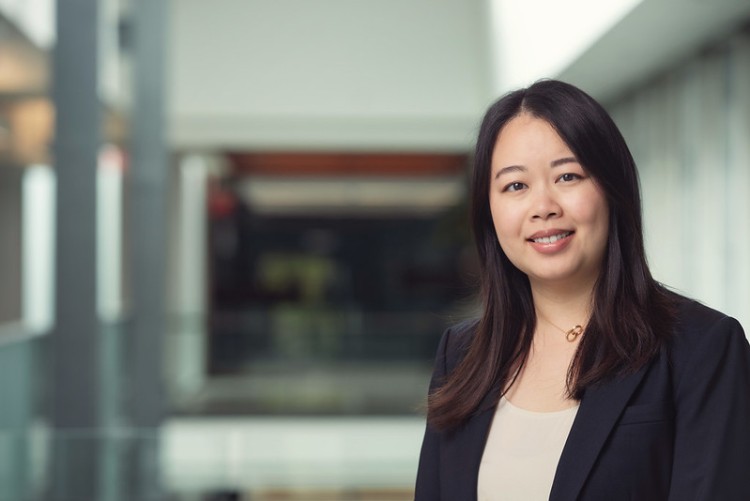At UBC Sauder, faculty members are more than just ‘professors.’ They conduct impactful research that is changing how society views the world while also inspiring students to pursue their academic passions and become the thoughtful, values-driven leaders the business world needs. This year, UBC Sauder welcomes ten new lecturers and tenure-track faculty to the school. In this article, we introduce you to Joy Wu, Assistant Professor in the Accounting and Information Systems Division.
Where are you from, and what brought you to UBC Sauder?
Before joining UBC, I was a postdoctoral researcher at LMU Munich and then a visiting lecturer at Cornell for one semester. I also received my PhD from Cornell. I was ecstatic about the opportunity to join UBC Sauder. It is an internationally recognized top business school. There is a lot of impactful research being conducted here, and UBC Sauder is dedicated to fostering a research-active and enriching environment for junior faculty. Also, the people who work at UBC Sauder are incredibly collegial and fun to be around!
What are your areas of research or your fields of expertise, and how did you get into this field?
I study what motivates individuals’ choices in areas such as privacy, fairness, and polarization. For example, I examine how people make decisions to share information or protect their personal data. I primarily use online survey experiments in my research, which are a great method for uncovering the preferences and beliefs that drive peoples’ choices.
I wanted to go to graduate school to learn how to design and run experiments. I think this aspiration came from my exposure to experimental economics in college. Directly before graduate school, I worked as an economics consultant for patent infringement cases in the software industry. I initially connected with my advisor because of my interest in intellectual property rights, and my advisor was conducting research in this area. Over the years, our interests and research conversations turned towards other information markets, such as markets for data. Eventually, I became focused and passionate about personal data markets and the behavioral questions underlying information-sharing choices.
What continues to fuel your research or interest in these areas?
Everyday life always inspires me to think about how individuals make choices. I like exercising observation and pattern-finding skills in ordinary situations. Sometimes I am my own subject, and I think (or agonize) about my decisions. Other times, I like observing the people around me, and if the opportunity allows me to gather more data, I like to ask people questions about what shapes their preferences. Outside of my daily life, the academic community both inside and outside of UBC fuels my passion for research. I get exposed to the work of other incredible scholars when I work with them, read their papers, and attend their presentations at seminars or conferences.
What inspires you to teach?
Students inspire me to teach. I often see students exceed their own expectations about their capabilities. A lot of students encounter concepts and tools that are new, and it is really inspiring for me to see how students can take these concepts and tools to unlock new ideas. As a scholar of digital markets, I am also interested in staying “in-touch” with how individuals are engaging with the digital world. Teaching young people is one great way to observe new technology adoption in a natural setting.
What’s one of the most interesting things you’ve discovered through your research or through your educational journey?
The idea that people don’t really care about their privacy has reached almost mythical status in some public policy and industry circles. This is often attributed to the willingness of individuals to give away their privacy for “free” to online companies. In reality nothing is free, and there is always an implicit price to an individual’s choice to give away privacy. Understanding what goes into that price is often both unclear and unobservable. It is also unfair to assume that people who care about their privacy should be aware of all the downstream consequences of data sharing, even if those consequences come decades later when new technologies are utilizing data in unprecedented ways. In my own work, I try to uncover the nuances of people’s privacy preferences and examine how they react to increasing awareness about data-sharing consequences.
What do you believe is the future of your industry?
Understanding how and why people value their privacy is strategically important for all firms that utilize individual data. As consumers become more aware of how their data are accessed and used by others, they can demand better products and services in return for that privacy loss. They may also find ways to regain control over their privacy. One interesting development is the rise of privacy service companies that are offering privacy protection from data brokers that sell user data in secondary data markets.
Can you tell us an interesting fact about yourself?
I’m always watching a TV show or listening to an audiobook when I’m at home on weekends. My other hobbies tend to change with seasons and years. I’ve done a few things that have held my interest for multiple years, such as playing the piano and violin, figure drawing, or participating in local robotics competitions. Most recently during graduate school and my postdoc, I played Dungeons & Dragons on weekends. Now that I’m in a new city, I look forward to new activities to take on as I explore Vancouver.
What are you most looking forward to in Vancouver?
I’ve lived in climates with more extreme weather than Vancouver, so I’m looking forward to the longer seasons of when it is neither too cold nor too hot to leave the house! I also look forward to working and living in a smaller, university town situated in a larger city. I think it offers a perfect balance of metropolitan and quiet living.

